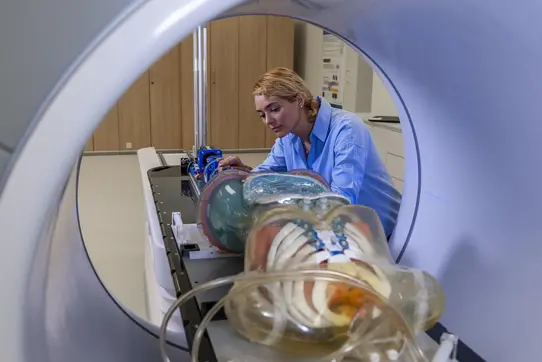Imaging and Radiooncology
The Research Topic Imaging and Radiooncology combines applied and translational cancer research groups focusing in the areas of cancer imaging, radiation therapy, radiopharmaceutical sciences, data science, surgical oncology and robotics. Our mission is to generate and translate scientific innovations in these fields to optimize the prevention, diagnosis, and treatment of cancer.

Multidisciplinary collaboration
We rely on multidisciplinary collaboration within the Topic and with our clinical partners to bridge the gap between discovery, technological development, and clinical translation.
Cancer Imaging
Our efforts in cancer imaging focus on the development of imaging technologies such as magnetic resonance imaging (MRI), computed tomography (CT), and positron emission tomography (PET) to allow better anatomical and functional imaging of cancer within the patient. Multiparametric imaging is applied in cancer patients for early detection and accurate localization of cancer, to assess local and distant spreading, and to provide information about the individual biologic behavior. A strong focus is on the improvement of image guidance for radiotherapy and surgery.
Radiation therapy
In radiation therapy, we develop novel therapeutic methods and technologies using photon and ion beams including protons, carbon ions, and others. Our work covers a broad spectrum from basic research in radiobiology to medical physics with the aim to integrate spatial, temporal, and biological information into radiotherapy planning. Since tumor motion as well as anatomical and functional changes all impact radiotherapy outcome, extensive research is performed on image-guided personalized and adaptive radiotherapy to mitigate motion effects during therapy and account for metabolic changes.
Radiopharmaceutical sciences
Research in radiopharmaceutical sciences aims at the design, development, and pre-clinical evaluation of novel targets and theranostic radiopharmaceuticals for imaging with PET and single-photon emission computed tomography (SPECT), disease stratification, and targeted radionuclide therapy (TRNT) of disseminated cancer. TRNT is an attractive treatment option for metastasized cancer disease, where radionuclides are directed to particular cancer-associated targets (receptors, antigens, enzymes, or other molecular structures) by specific binders, allowing effective treatment of disease spread throughout the body.
Data science
Data science focuses on machine learning and information processing, with the particular aim of improving cancer patient care by systematic data analytics. Building on advances in surgical, radiological, and clinical data sciences, such as image interpretation, holistic data processing, and semantic modeling, IT platform technology is being developed to integrate heterogeneous patient data including clinical and genomic characteristics and to process the large volumes of data. These platforms are used nationally and internationally to achieve FAIR access and utilization of data and biosamples.
Surgical oncology
In surgical oncology, we focus on intelligent assistance systems for the operating room of the future by combining robotics with surgical artificial intelligence (AI). Technologies include multispectral imaging and real-time data analysis for perfusion monitoring as well as short-wave infrared imaging to improve the surgical removal of tumors, including detection of individual cancer cells. We have recently leveraged advances in robotics technology by building up a new focus area on precision surgery and interventions based on nano to macroscopic-scale robotics, wireless sensors, and AI-based data augmentation. These technologies will enable novel minimally invasive surgical techniques including targeted drug delivery.
Translational Activities
The Research Topic is highly interlinked with the other Research Topics at DKFZ to promote fundamental discoveries and facilitate technological development, and we maintain strong cooperation with the clinicians at the University Hospitals of Heidelberg and Mannheim and the National Center for Tumor Diseases (NCT), where we conduct prospective controlled clinical trials to allow for novel research discoveries to be rapidly adopted within the clinical environment. We are also tightly integrated within the network of the German Cancer Consortium (DKTK), and we interact closely with the Helmholtz Center in Dresden-Rossendorf (HZDR), which also has a program in Imaging and Radiooncology and is our partner in the Helmholtz Consortium for Radiopharmaceutical Sciences (HV RPW). Furthermore, DKFZ is a partner in the Heidelberg Institute for Radiation Oncology (HIRO), which is part of the National Center for Radiation Research in Oncology (NCRO), within which we closely cooperate with OncoRay in Dresden and its operating partners such as the University Hospital Dresden and HZDR.